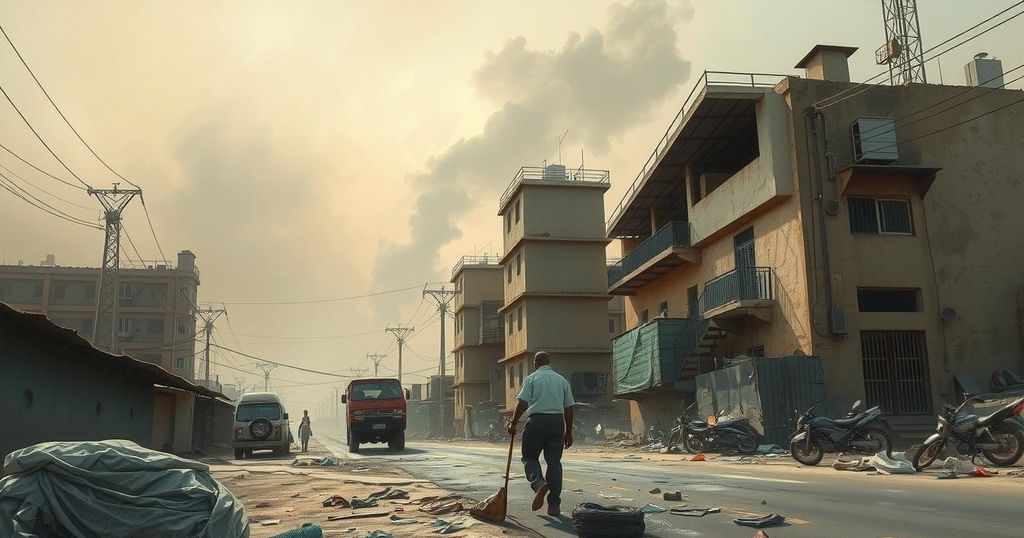Alarming Pollution Levels in Africa: Ghana, Nigeria, Chad, and Rwanda Among the Most Affected Countries

The 2024 World Air Quality Report indicates that Ghana, Nigeria, Chad, and Rwanda rank among the world’s most polluted countries. Chad leads with a PM2.5 concentration of 91.8 µg/m³, raising severe health concerns across Africa. Ghana’s pollution levels have surged dramatically, necessitating urgent environmental policy reforms to mitigate adverse health effects and economic impacts.
The 2024 World Air Quality Report has revealed a critical pollution crisis in Africa, with Ghana, Nigeria, Chad, and Rwanda identified as some of the world’s most polluted nations. These findings emphasize the deteriorating air quality that threatens millions of lives. Chad ranked first globally with a concerning PM2.5 concentration of 91.8 µg/m³, nearly 18 times above the World Health Organization’s (WHO) recommended limit of 5 µg/m³. Nigeria, Rwanda, and Ghana followed suit, with PM2.5 levels recorded at 40.1 µg/m³, 40.8 µg/m³, and 35.8 µg/m³ respectively.
PM2.5 particles, which are significantly smaller than dust, can cause severe health issues, including respiratory and cardiovascular diseases, as they penetrate deep into the lungs and bloodstream. The University of Chicago’s Air Quality Life Index indicates that air pollution reduces life expectancy by an average of 2.7 years in heavily polluted areas. In Ghana alone, WHO data from 2019 estimated that 28,000 deaths annually were attributable to air pollution, equating to approximately one death every 19 minutes.
Recent statistics indicate that Ghana’s air quality is alarming, standing seven times above the WHO’s safe limit. Accra was placed as the 16th most polluted capital city globally, while Kumasi emerged as the most polluted city in Ghana, recording 39.5 µg/m³. Over the past two years, Ghana’s pollution levels have escalated from 30.2 µg/m³ in 2022 (ranked 27th) to this year’s 35.8 µg/m³, marking it as the 14th most polluted country worldwide.
The report further reveals that five of the top ten most polluted countries globally are in Africa. However, only 24 out of the 54 African nations reported air quality data, underlining significant monitoring gaps. Alarmingly, 34% of African cities have PM2.5 levels three to five times higher than recommended by the WHO, while 24% reported levels five to seven times above the threshold.
The air pollution crisis in Ghana is a pressing public health issue; if the current trend persists, it is predicted that 2,333 individuals will succumb to pollution-related health problems every month. These rising PM2.5 levels have been linked to various serious health complications, including cognitive decline and premature death, with an anticipated economic toll exceeding $137.8 billion by 2040 if corrective measures are not implemented.
Globally, only 17% of cities managed to meet the WHO’s air quality guidelines, while a few nations, including Australia, Estonia, and New Zealand, achieved compliance. The report attributes several factors to Africa’s air pollution crisis, including rapid urbanization, population growth, and industrial emissions, as well as the unregulated burning of waste.
In conclusion, there is an urgent need for Ghana and African nations to enact stricter environmental policies. Proposed measures include improving vehicle emission standards, increasing investments in renewable energy, and enhancing air quality monitoring infrastructure. Prompt action is essential to prevent further deterioration of air quality and protect public health in the region now facing the grim reality of toxic air.
The 2024 World Air Quality Report highlights a dire pollution crisis in Africa, particularly in Ghana and its neighboring countries. PM2.5 levels are alarmingly high, significantly exceeding WHO guidelines, which poses a serious public health threat. With the rising death toll linked to poor air quality, it is imperative that both governmental actions and community involvement work towards stricter regulations and comprehensive monitoring. The alarming data calls for immediate action to avert a worsening health crisis and economic fallout.
Original Source: www.myjoyonline.com








